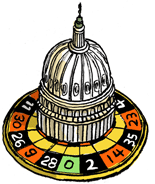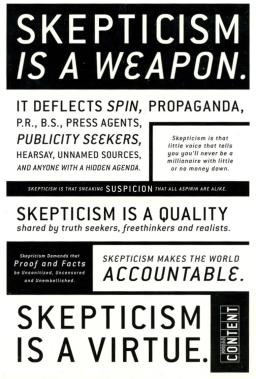 I just can’t believe that Al Gore just won the Nobel Peace Prize. I don’t understand why he is so deserving of the award. I understand that he has brought a lot of attention to the problem of global warming. And, I personally believe this is a huge problem, one that is, before all is said and done, going to require huge changes in how we live. As a result, I do think that Gore is doing something useful and necessary. But, I don’t believe he deserves the Nobel Prize.
I just can’t believe that Al Gore just won the Nobel Peace Prize. I don’t understand why he is so deserving of the award. I understand that he has brought a lot of attention to the problem of global warming. And, I personally believe this is a huge problem, one that is, before all is said and done, going to require huge changes in how we live. As a result, I do think that Gore is doing something useful and necessary. But, I don’t believe he deserves the Nobel Prize.
To me, it seems that Gore is like many celebrities. He has found a cause he can champion and is doing a great job at that. Just like all the celebrities that champion a free Tibet, ending the war in Iraq, and so on. But, really, what has Gore done? It is said he has brought great awareness to the plight of global warming. I admit that he has increased awareness in the US somewhat. Not to the extent needed, really, for real change, but ok, more people are aware it is an issue. But has he done this on a global scale? It is my understanding that people in Europe are familiar with his movie, but did that make them aware of the problem? It seems to me that Europe was already aware of global warming and already taking steps to deal with it (like the congestion toll in London, for example). And has he reached anyone in countries like China and India, where it will be most crucial (just think of what happens if the people in those two countries reach consumption levels we have in the US)? It doesn’t seem so to me.
And even in the US, is our increased awareness really attributable to Gore? Isn’t it the better science underpinning our understanding of climate change that is making the difference in how people perceive global warming? Don’t the lists of respected scientists that support the view of human activity causing some measure of global warming carry orders of magnitude more weight than Gore’s movie? And who did his movie convince anyways? Did any Republicans watch his movie? Did he change the mind of anyone who wasn’t already on his side? It seems to me that Gore’s impact has really not been so great as people say. Clearly, he is part of our greater awareness of the issue, but is he really that central of a piece? I personally don’t think so.
Gore hasn’t done anything to understand climate change and global warming. That is the work of the scientists dedicating their lives to the cause. It is because of them and their computer models and measurements of the environment that Gore even has data to present (somewhat mistakenly, it seems at times). So, he isn’t doing anything to understand the problem. Is he doing anything to fix it? Not in his personal life, unless you count his carbon offsets, which amount to planting trees in some far-off land. And probably cost him less in a lifetime than he gets via revenue from his movie or the money associated with the Nobel. And I haven’t seen any real serious proposals on his part on how to fix it. So, I just don’t understand why he deserves the Prize. Why aren’t the people who are working to understand and fix the problem getting the recognition? (Though, admittedly, that might be the role of the UN Panel on Climate Change that was also recognized, I’m not too sure (though, see below).)
Part of my problem with Gore is that, while I believe he is sincere about his concern about global warming, it almost seems secondary to me. It seems that his primary focus is himself. That the publicity for himself is more important than the actual cause. I don’t get this feeling, for example, from Jimmy Carter, another ex-national politician who has also dedicated himself to personal causes. With Carter, I get the feeling that the cause is first and all the attention is second. With Gore, it seems the other way around.
The only thing I can figure is that the Nobel committee wants to keep global warming front and center, and they can only recognize individuals in any significant way, and Gore is as good a figure head as any for the cause of global warming. Probably better than most. And so this is the committee’s way of weighing in on global warming, pointing out how they also see it as a huge and important problem. In the end, from the perspective of trying to fix global warming, this is the best the Nobel committee could do. And, in that light, maybe it is worth giving the prize to a figurehead, a celebrity who has taken up the cause. But does that mean Gore as a person deserves the Peace Prize? It sure doesn’t feel that way to me.
I just heard on NPR a report on the UN Panel that was the co-winner of the Prize. Now these seem like the people who deserve it, to me. While not the scientists who are necessarily conducting the actual research, these 2000-odd people are scientists who collate and distill of the science on climate change going on in the world and parse it so politicians can understand. These are the guys that write the reports that define our understanding of our role in global warming and try to get politicians to do something about it. These are the people who deserve this kind of recognition, in my opinion.
Like this:
Like Loading...

 About one month ago (more or less), I sent this to NPR’s series “This I Believe”. We should see if they like it or not soon… The image is from a postcard I picked up in some bar in Seattle. I wish they had made a poster-sized version of it!
About one month ago (more or less), I sent this to NPR’s series “This I Believe”. We should see if they like it or not soon… The image is from a postcard I picked up in some bar in Seattle. I wish they had made a poster-sized version of it!  It wasn’t so long ago that Congress passed and Bush signed the America COMPETES act (I’m sure COMPETES is some big acronym for a goofy-sounding title, but I’m too lazy to look it up). Anyways, this was supposed to be some big new initiative to reinvigorate America, to develop the areas that need developing to ensure America is competitive. One of the main aspects of this act was to increase the funding for both science and science education.
It wasn’t so long ago that Congress passed and Bush signed the America COMPETES act (I’m sure COMPETES is some big acronym for a goofy-sounding title, but I’m too lazy to look it up). Anyways, this was supposed to be some big new initiative to reinvigorate America, to develop the areas that need developing to ensure America is competitive. One of the main aspects of this act was to increase the funding for both science and science education. I just can’t believe that Al Gore just won the Nobel Peace Prize. I don’t understand why he is so deserving of the award. I understand that he has brought a lot of attention to the problem of global warming. And, I personally believe this is a huge problem, one that is, before all is said and done, going to require huge changes in how we live. As a result, I do think that Gore is doing something useful and necessary. But, I don’t believe he deserves the Nobel Prize.
I just can’t believe that Al Gore just won the Nobel Peace Prize. I don’t understand why he is so deserving of the award. I understand that he has brought a lot of attention to the problem of global warming. And, I personally believe this is a huge problem, one that is, before all is said and done, going to require huge changes in how we live. As a result, I do think that Gore is doing something useful and necessary. But, I don’t believe he deserves the Nobel Prize.